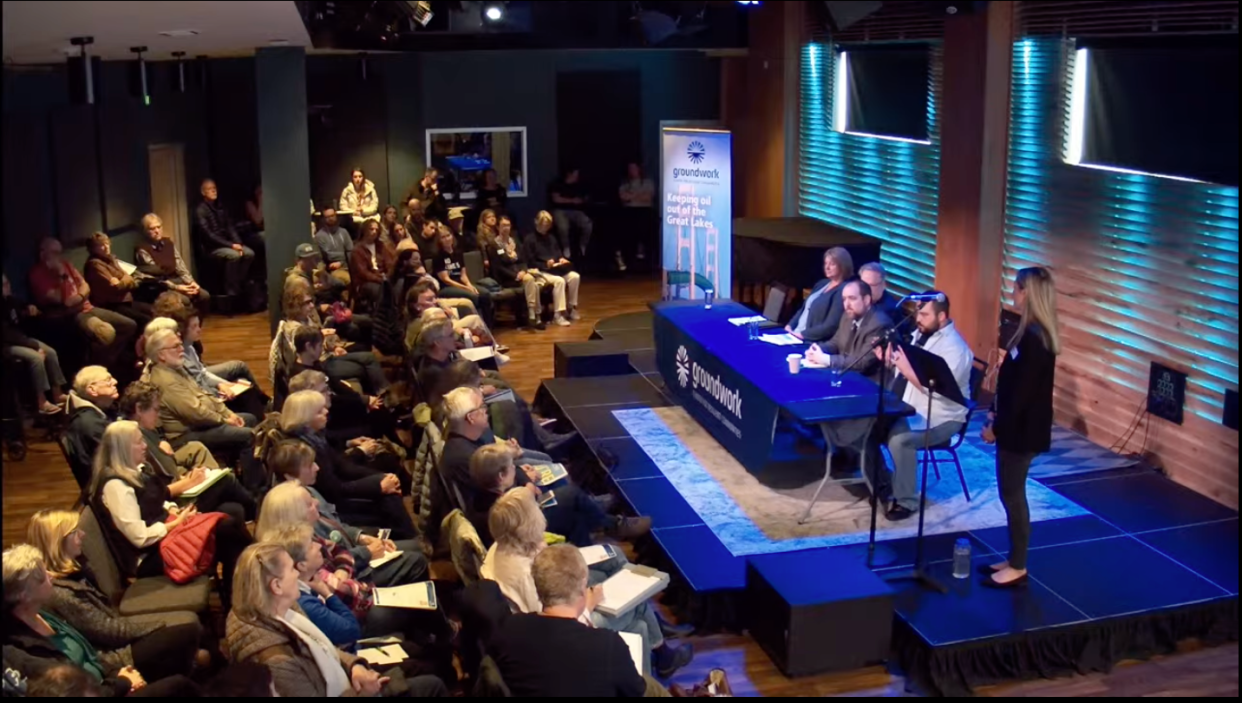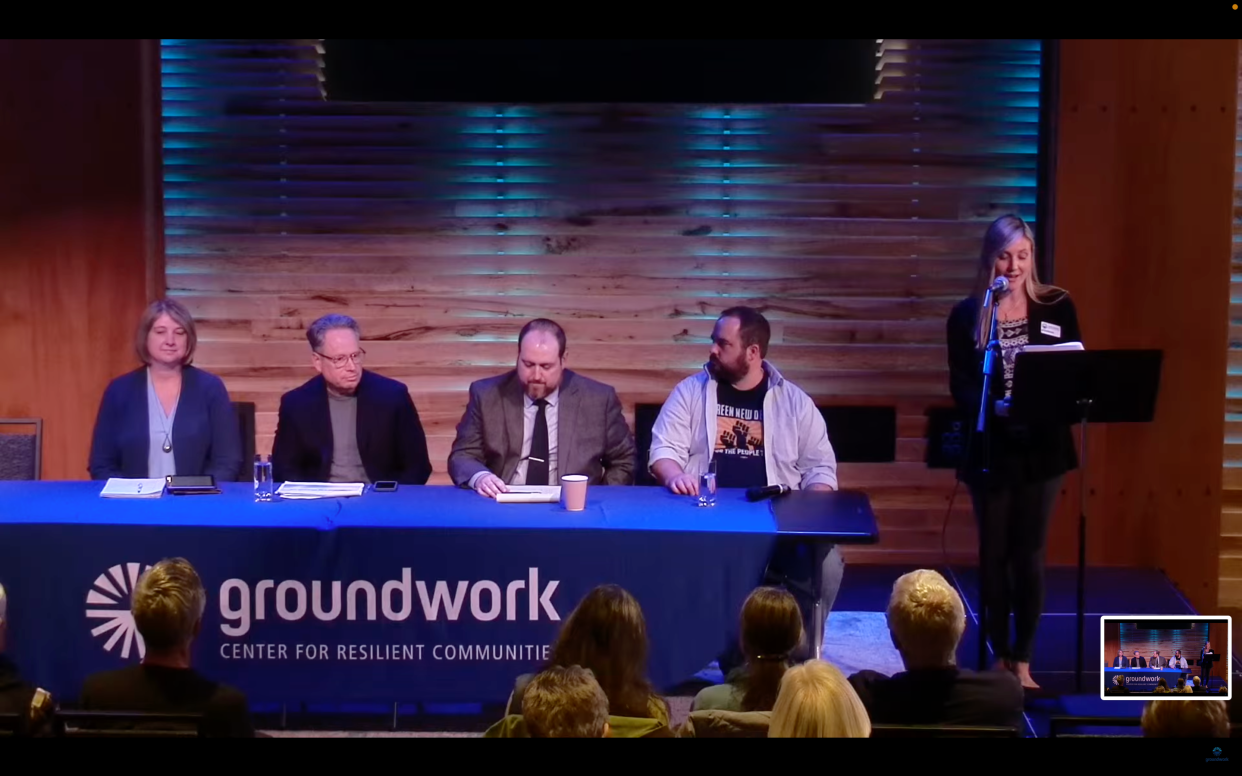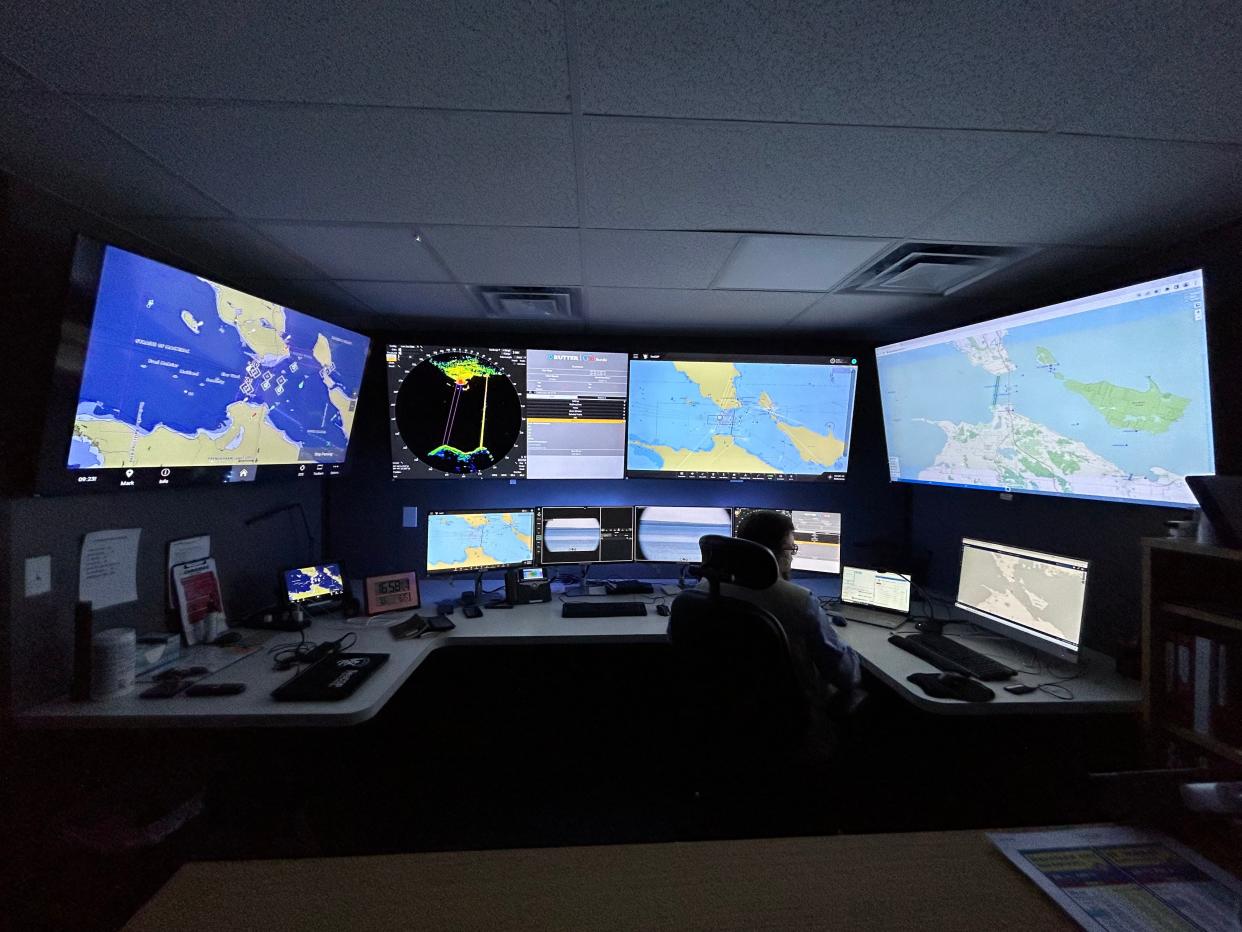Groundwork hosts panel forum to discuss Line 5 tunnel project

TRAVERSE CITY — On Wednesday night, more than 100 people tuned in virtually while dozens filed into the Alluvion in Traverse City for a program regarding Enbridge Energy’s Line 5.
A panel of speakers addressed the crowd during the event, which was aimed at rejecting Enbridge’s oil tunnel plans.
Moderated by Ashley Rudzinski, Groundwork Center for Resilient Communities' climate and environment program director, the panelists each spoke about their expertise on the topic and why they oppose the operation of Line 5 and the building of a tunnel through the Straits of Mackinac.
More: DOJ weighs in on Line 5 trespass on tribal land in Wisconsin
Line 5 is a pipeline that was built in 1953, transporting crude oil and natural gas liquids through a 645 mile-long route that runs from Superior, Wisconsin, through the Straits of Mackinac before ending in Sarnia, Ontario.
The discussion held Wednesday night primarily concerned the 4 miles of the pipeline that crosses through the straits.
Rudzinski introduced the panel and the background for the discussion, which came following the Michigan Public Service Commission’s December approval of Enbridge’s 2020 request to replace and relocate the segment of Line 5 that runs through the Straits of Mackinac into a tunnel beneath the straits. The approval is being appealed.

Sean McBrearty, operations director for Oil and Water Don’t Mix, is an advocate for shutting down Line 5. During the meeting, he spoke about the history of Line 5 and Enbridge.
McBrearty said the fight to shut down Line 5 really started after the 2010 Kalamazoo oil spill, when a failure in Enbridge’s Line 6B burst and flowed into Talmadge Creek.
Environmental advocates have expressed concerns about the devastating risk of a rupture in the straits. On the other side, proponents of the pipeline point to the economic impact and need for fuel transportation.
McBrearty added that he feels the commissions that have been making decisions regarding the tunnel proposal have not done a thorough enough review of the proposal, and claimed the Michigan Department of Environment, Great Lakes, and Energy only looked at the northern and southern shores, rather than the area the tunnel would actually run through. He also noted that one plan's approval is contingent upon reviewing Enbridge’s data, rather than having a study conducted themselves.
“We are at a real risk of this project being permitted with nobody actually reviewing the plans,” McBrearty said.
More: As legal sparring continues, Army Corps pushes Line 5 permit timeline to 2025
Next, Dan Bock, assistant attorney general, spoke to the crowd about the litigation that is in process and has been for what is now coming up on five years.
In summer 2019, Attorney General Dana Nessel filed a lawsuit against Enbridge arguing that:
The easement agreement and the pipeline’s location in the bottomlands of the Staits of Mackinac violates the public trust doctrine and that the easement was never valid,
The location of the pipeline creates a common law public nuisance and violates the Michigan Environmental Protection Act,
To get the case back into state courts where motions have been filed since 2020 and awaiting decision.
Brian O’Mara, a geological engineer and tunnel expert, addressed the crowd next to discuss his four hours of expert testimony on the Michigan Public Service Commission case and the more than 500 hours he has spent reviewing the plans.
“Tunneling beneath open water — people have been trying it for hundreds of years. It is the most complicated, most challenging, difficult thing we can do on Earth,” O’Mara said. “It may sound simple, but it is not.”
He said he became an expert very quickly on learning about methane levels in tunnels because he has worked in them for 35 years. He spoke about a 2017 study that was needed in order to get approval for a Line 5 tunnel, and that Enbridge originally said they did not anticipate that there would be methane or toxic gases.
“Well, Enbridge found it,” he said. “They tried to downplay it, they tried to ignore it.”
The original plan included backfilling the tunnel with concrete, which would support the tunnel, and help prevent explosions and floods.
He alleges the company has little to no experience in tunnels, and different concerns are being ignored.
“They don’t know what they’re doing, and they don’t know that they don’t know what they’re doing, and they won’t listen to people who do know what they’re doing,” O’Mara said. “That combination of ignorance and arrogance is really dangerous.”
Executive Director of the Michigan Climate Action Network Denise Keele spoke next, talking about climate change and the burning of fossil fuels.
“The real danger of this in my mind, and for the Michigan Climate Action Network, and I hope for all of you, is that this is not safe because greenhouse gases are not safe and we are in a climate emergency,” she said.
She said the burning of fossil fuels is contributing to rising temperatures, leading to historic high temperatures, last summer’s Canadian wildfire season, and dam failures in the state.
Subscribe: Get unlimited access to our local coverage
The final speaker was Holly Bird, a Traverse City-based lawyer, water protector and Indigenous activist, who spoke about tribal sovereignty in cases like this one.
She spoke about different treaties providing support to tribes, and said that Enbridge already violated treaties by putting in the pipelines. She said there are meant to be consultations with the tribes that will be affected when you “cross or abrogate any kind of right a tribe may have.”
When the pipeline was put through originally, that consultation never happened, Bird said.
She also spoke about the Department of Justice’s recent decision stating Enbridge is trespassing on the Bad River Band of Lake Superior Chippewa’s land, who declined to renew an easement that expired more than a decade ago.
“This is dangerous. This is dangerous for all of us,” Bird said. “We know that because water is precious, we know that because air is precious, and our climate is precious. But in these cases what Enbridge is asking the court to do is completely ignore the rights of all of you. Not just us this time, but it’s all of you and all of us.”

In an email statement, Enbridge spokesman Ryan Duffy said "Enbridge is investing in a cleaner energy future and the transportation systems that deliver energy resources safely, affordably and reliably."
"Our commitment to protecting the Great Lakes continues to drive our work to build the Great Lakes Tunnel, deactivating the section of Line 5 that currently sits in the waters of the straits and locating a replacement section inside the confines of the tunnel, deep under the lakebed," he added. "We remain fiercely committed to protecting the natural resources of Michigan and the Great Lakes region, and to building the Great Lakes Tunnel. We have been pursuing permits for the construction of the tunnel since 2020 and currently hold permits from the Michigan Department of Environment, Great Lakes and Energy and the Michigan Public Service Commission. We await a permit from the U.S. Army Corps of Engineers."
Duffy also noted that "The Great Lakes Tunnel for Line 5 at the straits makes what has always been a safe pipeline even safer, ensuring energy access and reliability, and supporting jobs and the economy throughout the Great Lakes region. Building the Great Lakes Tunnel has the support of 70 percent of Michiganders."
Duffy also countered some points made during the panel, including:
"Tunnels are used safely every day across the globe. The Great Lakes Tunnel will conform to all approved tunnel specifications and will be subject to environmental reviews. We will continue to work with the Straits Corridor Authority, which has oversight responsibility and with permitting agencies. We will continue to use industry leading expertise, and the tunnel will be built to stand the test of time. We are partnering with world-class firms on the Great Lakes Tunnel Project. The expertise of these firms has shaped the design and engineering process."
"The geology is not known to have gas. The tunnel lining has a double gasket, reducing the infiltration of any gases as well as water. While the geology is not known to have gas, OSHA’s requirements will be adhered to for construction in a potentially gassy atmosphere. This will include continuous monitoring of atmospheric conditions within the tunnel during construction, including fixed monitoring points on the TBM."
— Contact reporter Karly Graham at kgraham@petoskeynews.com. Follow her on Twitter at @KarlyGrahamJRN.
This article originally appeared on The Petoskey News-Review: Groundwork hosts panel forum to discuss Line 5 tunnel project
